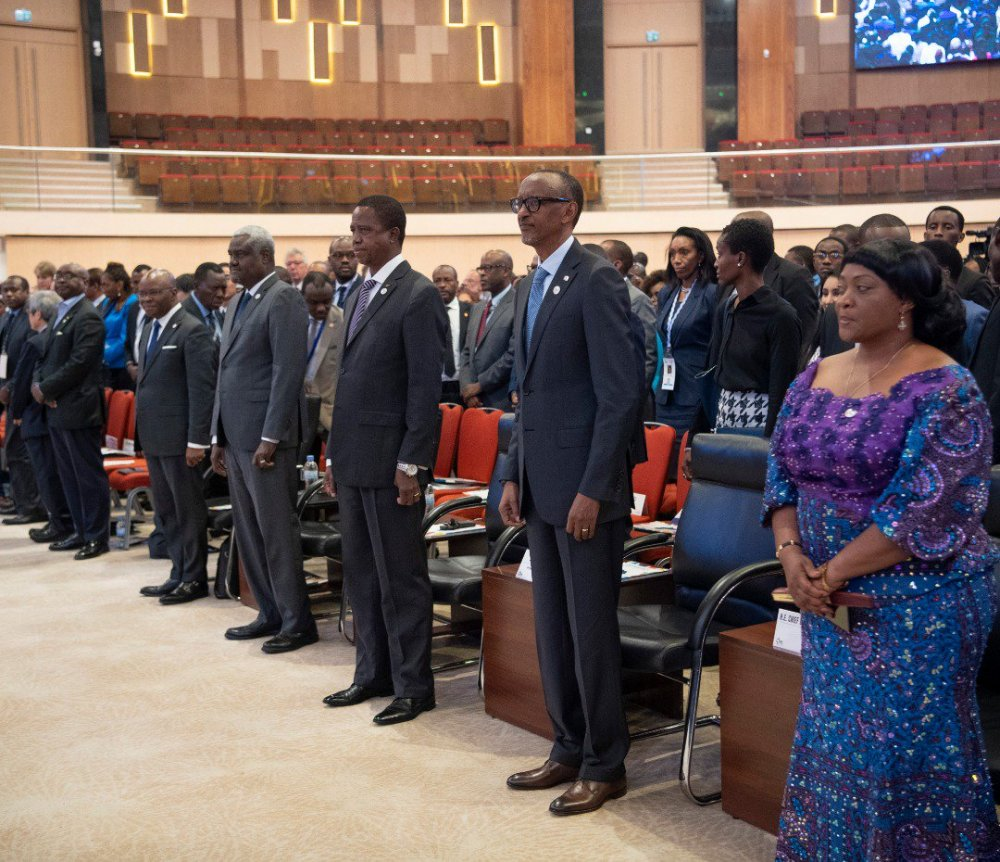
Pictured on 13 June 2019 at the main conference: Front Row from Right: Vice President Dr. Jewel C. Howard-Taylor of Liberia, President Kagame of Rwanda, President Edgar Lungu of Zambia, , and _Moussa Faki (Africa Union)
The Sustainable Development Goal (SDG) Centre for Africa (SDG/CA) convened a conference “SDGs Implementation in Africa – Reflections on A Three-Year Journey”. The conference was held on 13 June 2019 in Kigali, Rwanda. Over two thousand participants convened in Kigali and engaged in effective dialogue on the optimal functioning of the SDGs systems in Africa. In addition to the Presidents Paul Kagame of Rwanda, Edgar Lungu of Zambia and Vice President Taylor of Liberia, the conference participants included representatives from various stakeholders including leaders from governments across Africa, Ambassadors and High Commissioners , the United Nations, bilateral institutions, international and other non-governmental organizations, universities and research institutions, civil society and the private sector. Dr Jane Olwoch, SASSCAL executive Director was also in attendance.
President Paul Kagame of Rwanda urged African countries to renew their commitment to achieve the (SDGs), indicating that ownership by Africans to deal with challenges to implement the goals will be crucial going forward. On the issue of the SDG financing gap in Africa, which the SDG Centre for Africa has estimated between $500billion and $1.2trillion per year, Kagame said that Africans need to own the challenge and harness ways to fund the gap.
The main conference on the 13th June was preceded by a two day pre-conference sessions 11 -12 June. Discussions at the 2 day pre-conference included enhancing National M&R Systems and Capacities for SDG Monitoring and Reporting. The success of the SDG agenda depends heavily on an efficient and robust monitoring of its progress. However, in the African context, much needs to be done, and it must be a priority. African nations must have in place high quality, accessible, timely and reliable disaggregated data in order to measure progress, ensure accountability and achieve the SDGs by 2030. The 2030 Agenda explicitly calls for building capacity to support national plans to implement the SDGs. At the pre-conference, Dr Jane Olwoch, cautioned against existence of several uncoordinated and disaggregated actions in Africa looking at the same issues. She called upon heads of international and other intergovernmental organisation to convene in order to assess commonalities that could be brought together to increase complementarity, reduce duplication and speed up progress. She further reminded the participants of the key goal – Goal 13 Climate Action and responsibilities contained in the Paris Agreement; which if not adequately responded to, has potential to derail the realisation of all other SDGs.

With only twelve years left to meet the SDGs targets, this Conference provided a platform for all stakeholders to critically reflect and discuss the progress that has been made towards achieving the SDGs in Africa so far.
Following the adopting of SDGs in September 2015, Africa has made commitments to the Sustainable Development Goals Universal Agenda (SDG 2030) and the Africa Union Agenda 2063. At the adoption of the SDGs, Africa’s starting point was lower than all the other regions in terms of GDP, human development indicators and fragility with 80% of the world’s fragile states found on the continent among others. It remains the world’s poorest region, one that is yet to undergo demographic transition and arguably faces across-the-board challenges in meeting all of the SDGs. This placed the continent at crossroads with low tax revenue to GDP on one end of the problem and enormous development needs on the other end.
At the conference, the 2019 Africa SDG Index and Dashboard was launched at the main Conference on 13 June 2019. The launched Africa SDG Index and Dashboards Report 2018 re-affirmed that African countries lag behind the rest of the world in terms of achieving the SDGs with heterogeneous performance by different regions on different indicators, and thus a one-size all solution will not prevail. The pace of development progress in Africa over recent years was assessed as insufficient for the attainment of the 2030 agenda. Through the conference high-level discussions, pragmatic and evidence based recommendations were developed for African countries to stay on track towards SDG achievement on areas including: (i) the governance and institutional framework for SDG achievement in Africa, (ii) filling the SDG data gaps, (iv) financing, including alternative sources of financing, and (iii) social inclusiveness. The Conference thus informed and urged its high level participants to take the information and key messages back to their countries in order to continue to push for urgent action and necessary reforms in order for all African countries to achieve the SDGs by 2030.
Compiled by SASSCAL Communications and Marketing
Enquiries: communications@sasscal.org




